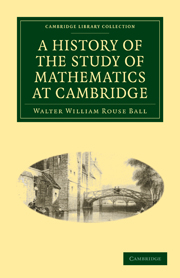Book contents
- Frontmatter
- PREFACE
- Contents
- Chapter I Mediæval mathematics
- Chapter II The mathematics of the renaissance
- Chapter III The commencement of modern mathematics
- Chapter IV The life and works of Newton
- Chapter V The rise of the Newtonian school
- Chapter VI The later Newtonian school
- Chapter VII The analytical school
- Chapter VIII The organization and subjects of education
- Chapter IX The exercises in the schools
- Chapter X The mathematical tripos
- Chapter XI Outlines of the history of the university
- INDEX
Chapter IX - The exercises in the schools
Published online by Cambridge University Press: 07 September 2010
- Frontmatter
- PREFACE
- Contents
- Chapter I Mediæval mathematics
- Chapter II The mathematics of the renaissance
- Chapter III The commencement of modern mathematics
- Chapter IV The life and works of Newton
- Chapter V The rise of the Newtonian school
- Chapter VI The later Newtonian school
- Chapter VII The analytical school
- Chapter VIII The organization and subjects of education
- Chapter IX The exercises in the schools
- Chapter X The mathematical tripos
- Chapter XI Outlines of the history of the university
- INDEX
Summary
I purpose now to give an account of the scholastic acts to which so many references were made in the last chapter, and to illustrate their form by reproducing one on a mathematical subject.
I have already enumerated the subjects of instruction enjoined by the Elizabethan statutes, and it is certain that it was intended that the scholastic disputations should be kept on philosophical questions drawn from that curriculum.
The statutes however had hardly received the royal assent before the philosophy of Ramus (see p. 14) became dominant in the university; and the discussions were tinged by his views. About 1650 the tenets of the Baconian and Cartesian systems of philosophy became the favourite subjects in the schools of the university. Some fifty years later they were displaced by subjects drawn from the Newtonian philosophy, and thenceforth it was usual to keep some of the disputations on mathematical subjects; though it always remained the general custom to propound at least one philosophical question, which was frequently taken from Locke's Essay, In 1750 it was decided in Cumberland's case that it was not necessary for a candidate to offer any except mathematical subjects.
The earliest list with which I am acquainted of questions kept in the schools is contained in the Disputationum academicarum formulae by R. F., published in 1638. A list of questions on philosophy in common use during the early years of the eighteenth century was published in 1735 by Thomas Johnson, who was a fellow of Magdalene College and master at Eton.
- Type
- Chapter
- Information
- A History of the Study of Mathematics at Cambridge , pp. 164 - 186Publisher: Cambridge University PressPrint publication year: 2009First published in: 1889

